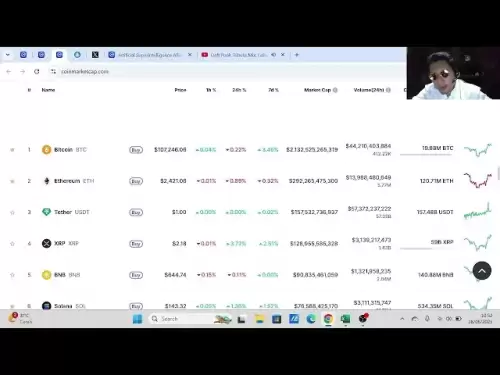-
 Bitcoin
Bitcoin $107,352.1067
0.28% -
 Ethereum
Ethereum $2,429.3531
-0.90% -
 Tether USDt
Tether USDt $1.0001
-0.02% -
 XRP
XRP $2.1894
4.62% -
 BNB
BNB $646.7968
0.36% -
 Solana
Solana $147.4290
4.03% -
 USDC
USDC $0.9998
-0.02% -
 TRON
TRON $0.2756
1.52% -
 Dogecoin
Dogecoin $0.1630
1.14% -
 Cardano
Cardano $0.5612
1.18% -
 Hyperliquid
Hyperliquid $37.0580
-0.05% -
 Bitcoin Cash
Bitcoin Cash $496.9410
-0.09% -
 Sui
Sui $2.7318
3.19% -
 Chainlink
Chainlink $13.1503
0.58% -
 UNUS SED LEO
UNUS SED LEO $9.0766
0.55% -
 Avalanche
Avalanche $17.7220
1.46% -
 Stellar
Stellar $0.2380
1.52% -
 Toncoin
Toncoin $2.8439
0.38% -
 Shiba Inu
Shiba Inu $0.0...01143
1.84% -
 Litecoin
Litecoin $85.8053
1.47% -
 Hedera
Hedera $0.1483
2.70% -
 Monero
Monero $314.3240
2.12% -
 Bitget Token
Bitget Token $4.6725
0.77% -
 Dai
Dai $1.0000
0.00% -
 Polkadot
Polkadot $3.3555
1.28% -
 Ethena USDe
Ethena USDe $1.0001
0.02% -
 Uniswap
Uniswap $7.0890
2.64% -
 Pi
Pi $0.5355
-3.40% -
 Pepe
Pepe $0.0...09393
1.06% -
 Aave
Aave $256.8136
-1.90%
How to cancel pending transactions in Trust Wallet?
Pending transactions in Trust Wallet await blockchain confirmation; delays can stem from network congestion, low gas fees, or address issues. Patience or fee adjustments may help.
Apr 01, 2025 at 01:08 am
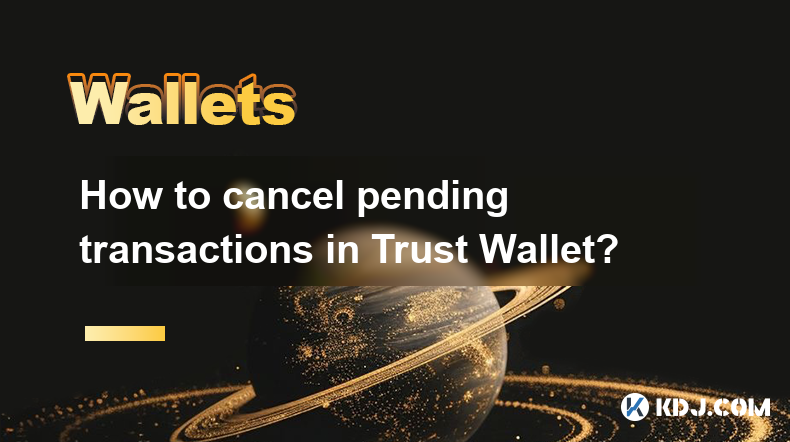
Understanding Pending Transactions in Trust Wallet
A pending transaction in Trust Wallet means your cryptocurrency transfer is awaiting confirmation on the blockchain network. This delay can be caused by network congestion, insufficient gas fees, or issues with the receiving address. The length of time a transaction remains pending varies drastically depending on the specific blockchain and its current activity. It's crucial to understand that you can't directly cancel a pending transaction in the same way you might cancel a regular online purchase. Instead, you need to employ strategies to expedite its confirmation or, if necessary, handle the situation arising from the delay.
Why Transactions Remain Pending
Several factors contribute to pending transactions. Network congestion is a common culprit, particularly on popular blockchains like Ethereum, where many transactions compete for processing. Insufficient gas fees can also lead to delays, as miners prioritize transactions with higher fees. Incorrectly entered receiving addresses or issues with the receiving wallet can also cause a transaction to stall indefinitely. Finally, blockchain network issues can temporarily halt transaction processing.
Methods to Address Pending Transactions
While you can't directly cancel a pending transaction, you can take steps to encourage its processing or mitigate the consequences. These methods are not guarantees of success, and their effectiveness depends on the specific circumstances.
Wait: Often, the simplest solution is to wait. Network congestion eventually subsides, and your transaction may process after some time. Patience is key, especially during periods of high blockchain activity. Monitor the transaction status within Trust Wallet.
Increase Gas Fees (If Applicable): If you initiated the transaction with low gas fees, you might be able to speed it up by submitting a replacement transaction with higher fees. This is not always possible, however, and depends on the specific cryptocurrency and wallet. Trust Wallet doesn't directly support this feature, but some decentralized applications (dApps) connected to it may offer options for adjusting transaction fees.
Contact Support (for extreme cases): If the transaction remains pending for an unusually long time and you suspect a problem beyond network congestion, consider contacting Trust Wallet support. They might be able to provide insights or assistance. However, they typically can't directly cancel the transaction.
Check Receiving Address: Double-check that the receiving address is correct. An incorrect address will result in a failed transaction, and the funds might be lost. This is a critical step to take before considering other options.
Monitor Blockchain Explorer: Use a blockchain explorer (like Etherscan for Ethereum) to track your transaction's status. This provides a more detailed view than Trust Wallet alone. The explorer will show you the transaction's status and any potential issues.
Understanding Blockchain Confirmation Times
The time it takes for a transaction to be confirmed varies greatly depending on the blockchain. Some blockchains, like Bitcoin, have longer confirmation times than others, such as some newer, faster blockchains. Understanding these inherent differences is crucial in managing expectations. Network congestion significantly impacts these times, sometimes causing substantial delays. Patience and monitoring are vital.
What to Do if a Transaction Fails
If a transaction fails after a prolonged period, and it's not just pending, you might need to take further action. This often involves reviewing the transaction details, checking the receiving address again for errors, and potentially contacting the exchange or service you sent the funds to. In some cases, recovery might be possible, but it's a complex process and may not always be successful. Always keep detailed records of your transactions.
Preventing Future Pending Transactions
Proactive measures can help minimize the chances of encountering pending transactions. Using appropriate gas fees, especially during periods of high network activity, is critical. Double-checking receiving addresses before sending funds is paramount to avoid irreversible errors. Staying informed about the current state of the blockchain network you're using can also help you anticipate potential delays.
Frequently Asked Questions
Q: Can I completely cancel a pending transaction in Trust Wallet?
A: No, Trust Wallet doesn't offer a direct "cancel" button for pending transactions. You can't forcibly stop a transaction already submitted to the blockchain.
Q: How long should I wait for a pending transaction?
A: The waiting time varies greatly depending on the blockchain and network congestion. It could range from minutes to hours or even longer. Monitor the transaction's status regularly.
Q: What if my pending transaction never confirms?
A: If a transaction remains pending indefinitely, it may have failed due to insufficient gas fees, an incorrect address, or a network issue. Check the receiving address, monitor the blockchain explorer, and consider contacting support if necessary.
Q: Can increasing gas fees always solve a pending transaction?
A: Increasing gas fees can sometimes speed up a transaction, but it's not a guaranteed solution. It's only applicable in certain circumstances and depends on the specific blockchain and wallet.
Q: What if I sent my crypto to the wrong address?
A: Sending crypto to the wrong address is a serious issue. The funds are likely lost. Contact the recipient (if possible) and the exchange or service you sent the funds from to explore recovery options. This is often a difficult and protracted process. Recovery is not guaranteed.
Disclaimer:info@kdj.com
The information provided is not trading advice. kdj.com does not assume any responsibility for any investments made based on the information provided in this article. Cryptocurrencies are highly volatile and it is highly recommended that you invest with caution after thorough research!
If you believe that the content used on this website infringes your copyright, please contact us immediately (info@kdj.com) and we will delete it promptly.
- Crypto's First Principles: Are Returns Still Rooted in Fairness?
- 2025-06-28 22:30:12
- Kaspa (KAS) Price Prediction 2025: Will It Hit $1?
- 2025-06-28 22:50:12
- A16Z Dumps $COMP on Coinbase: Liquidation or Rebalancing?
- 2025-06-28 22:30:12
- KraneShares, Coinbase, and Digital Assets: A New Era for Institutional Crypto?
- 2025-06-28 23:07:14
- Bitcoin Solaris: Mobile Mining Revolution & Beyond!
- 2025-06-28 22:35:13
- Bitcoin, Post-Dollar, and US Preparation: A New Digital Gold Standard?
- 2025-06-28 22:52:13
Related knowledge

How to stake cryptocurrencies on Coinbase? Benefits and risks
Jun 27,2025 at 06:36pm
Understanding Cryptocurrency Staking on CoinbaseStaking cryptocurrencies involves locking up digital assets to support the operations of a blockchain network, typically in return for rewards. Coinbase, one of the most popular cryptocurrency exchanges globally, offers staking services for several proof-of-stake (PoS) coins. Users can stake their holdings...

How to contact Coinbase customer service? Support channels and response times
Jun 28,2025 at 01:29pm
Contacting Coinbase Customer Service: Support Channels and Response TimesIf you're a user of Coinbase, reaching their customer service team may become necessary for various reasons, such as account verification issues, transaction disputes, or technical difficulties. Understanding the different support channels available and what to expect in terms of r...

Coinbase advanced trading function usage tutorial: limit orders and market orders
Jun 28,2025 at 09:07pm
Understanding the Difference Between Limit Orders and Market OrdersWhen using Coinbase's advanced trading features, it is crucial to understand the fundamental difference between limit orders and market orders. A market order executes immediately at the best available price on the market. This type of order ensures that your trade goes through quickly, ...
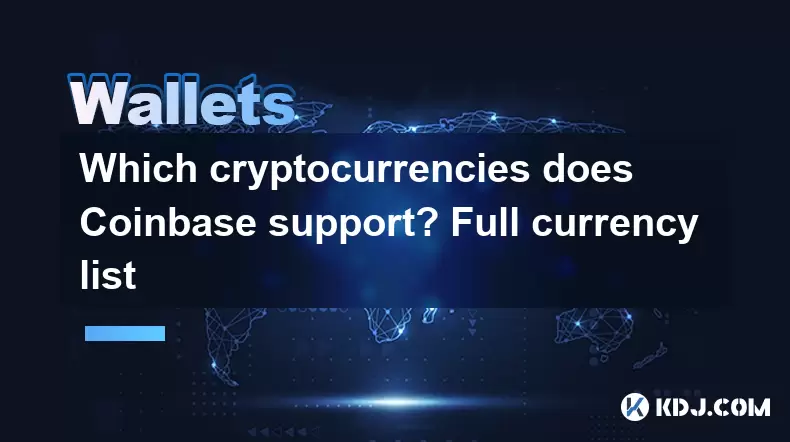
Which cryptocurrencies does Coinbase support? Full currency list
Jun 28,2025 at 08:36am
Overview of Cryptocurrencies Supported by CoinbaseCoinbase is one of the most popular and trusted cryptocurrency exchanges globally. It provides users with a platform to buy, sell, trade, and store various digital assets. As of the latest updates, Coinbase supports over 200 cryptocurrencies, including major ones like Bitcoin (BTC), Ethereum (ETH), and L...
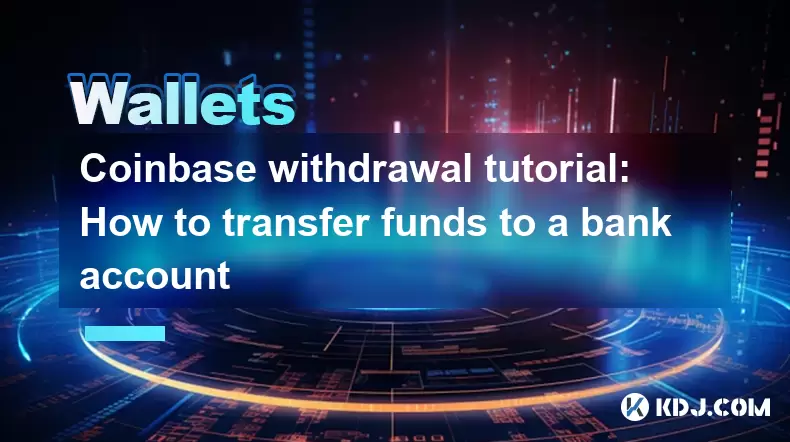
Coinbase withdrawal tutorial: How to transfer funds to a bank account
Jun 28,2025 at 02:35am
Understanding Coinbase WithdrawalsCoinbase is one of the most widely used cryptocurrency platforms, allowing users to buy, sell, and store digital assets. Once you've successfully traded or held your crypto on Coinbase, the next logical step may be to withdraw funds to a bank account. This process involves converting your cryptocurrency into fiat curren...
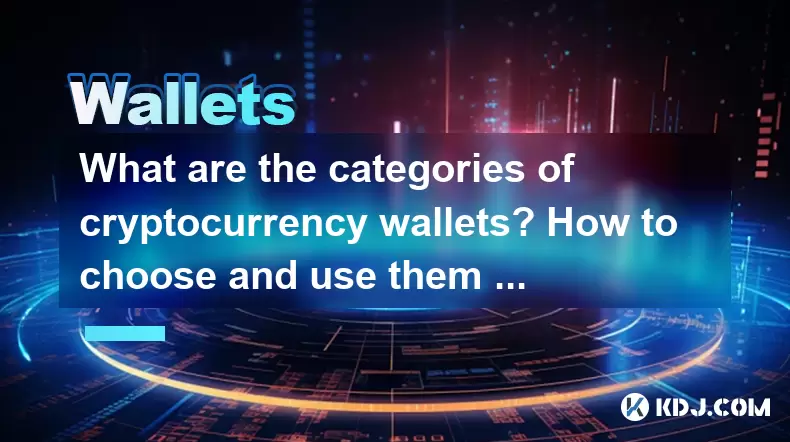
What are the categories of cryptocurrency wallets? How to choose and use them safely?
Jun 21,2025 at 10:42pm
Understanding Cryptocurrency WalletsCryptocurrency wallets are essential tools for anyone involved in the digital asset ecosystem. They allow users to store, send, and receive cryptocurrencies securely. Unlike traditional wallets that hold physical money, crypto wallets manage cryptographic keys—private and public—which interact with blockchain networks...

How to stake cryptocurrencies on Coinbase? Benefits and risks
Jun 27,2025 at 06:36pm
Understanding Cryptocurrency Staking on CoinbaseStaking cryptocurrencies involves locking up digital assets to support the operations of a blockchain network, typically in return for rewards. Coinbase, one of the most popular cryptocurrency exchanges globally, offers staking services for several proof-of-stake (PoS) coins. Users can stake their holdings...

How to contact Coinbase customer service? Support channels and response times
Jun 28,2025 at 01:29pm
Contacting Coinbase Customer Service: Support Channels and Response TimesIf you're a user of Coinbase, reaching their customer service team may become necessary for various reasons, such as account verification issues, transaction disputes, or technical difficulties. Understanding the different support channels available and what to expect in terms of r...

Coinbase advanced trading function usage tutorial: limit orders and market orders
Jun 28,2025 at 09:07pm
Understanding the Difference Between Limit Orders and Market OrdersWhen using Coinbase's advanced trading features, it is crucial to understand the fundamental difference between limit orders and market orders. A market order executes immediately at the best available price on the market. This type of order ensures that your trade goes through quickly, ...

Which cryptocurrencies does Coinbase support? Full currency list
Jun 28,2025 at 08:36am
Overview of Cryptocurrencies Supported by CoinbaseCoinbase is one of the most popular and trusted cryptocurrency exchanges globally. It provides users with a platform to buy, sell, trade, and store various digital assets. As of the latest updates, Coinbase supports over 200 cryptocurrencies, including major ones like Bitcoin (BTC), Ethereum (ETH), and L...

Coinbase withdrawal tutorial: How to transfer funds to a bank account
Jun 28,2025 at 02:35am
Understanding Coinbase WithdrawalsCoinbase is one of the most widely used cryptocurrency platforms, allowing users to buy, sell, and store digital assets. Once you've successfully traded or held your crypto on Coinbase, the next logical step may be to withdraw funds to a bank account. This process involves converting your cryptocurrency into fiat curren...

What are the categories of cryptocurrency wallets? How to choose and use them safely?
Jun 21,2025 at 10:42pm
Understanding Cryptocurrency WalletsCryptocurrency wallets are essential tools for anyone involved in the digital asset ecosystem. They allow users to store, send, and receive cryptocurrencies securely. Unlike traditional wallets that hold physical money, crypto wallets manage cryptographic keys—private and public—which interact with blockchain networks...
See all articles























